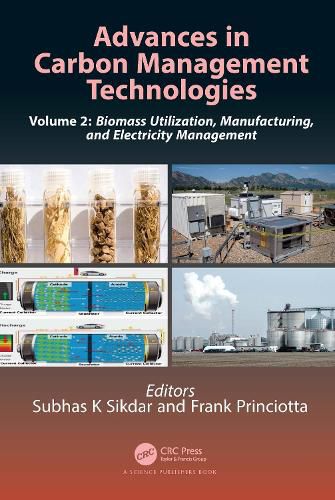Readings Newsletter
Become a Readings Member to make your shopping experience even easier.
Sign in or sign up for free!
You’re not far away from qualifying for FREE standard shipping within Australia
You’ve qualified for FREE standard shipping within Australia
The cart is loading…






Volume 2 of Advances in Carbon Management Technologies has 21 chapters. It presents the introductory chapter again, for framing the challenges that confront the proposed solutions discussed in this volume. Section 4 presents various ways biomass and biomass wastes can be manipulated to provide a low-carbon footprint of the generation of power, heat and co-products, and of recovery and reuse of biomass wastes for beneficial purposes. Section 5 provides potential carbon management solutions in urban and manufacturing environments. This section also provides state-of the-art of battery technologies for the transportation sector. The chapters in section 6 deals with electricity and the grid, and how decarbonization can be practiced in the electricity sector.
The overall topic of advances in carbon management is too broad to be covered in a book of this size. It was not intended to cover every possible aspect that is relevant to the topic. Attempts were made, however, to highlight the most important issues of decarbonization from technological viewpoints. Over the years carbon intensity of products and processes has decreased, but the proportion of energy derived from fossil fuels has been stubornly stuck at about 80%. This has occurred despite very rapid development of renewable fuels, because at the same time the use of fossil fuels has also increased. Thus, the challenges are truly daunting. It is hoped that the technology choices provided here will show the myriad ways that solutions will evolve. While policy decisions are the driving forces for technology development, the book was not designed to cover policy solutions.
$9.00 standard shipping within Australia
FREE standard shipping within Australia for orders over $100.00
Express & International shipping calculated at checkout
Volume 2 of Advances in Carbon Management Technologies has 21 chapters. It presents the introductory chapter again, for framing the challenges that confront the proposed solutions discussed in this volume. Section 4 presents various ways biomass and biomass wastes can be manipulated to provide a low-carbon footprint of the generation of power, heat and co-products, and of recovery and reuse of biomass wastes for beneficial purposes. Section 5 provides potential carbon management solutions in urban and manufacturing environments. This section also provides state-of the-art of battery technologies for the transportation sector. The chapters in section 6 deals with electricity and the grid, and how decarbonization can be practiced in the electricity sector.
The overall topic of advances in carbon management is too broad to be covered in a book of this size. It was not intended to cover every possible aspect that is relevant to the topic. Attempts were made, however, to highlight the most important issues of decarbonization from technological viewpoints. Over the years carbon intensity of products and processes has decreased, but the proportion of energy derived from fossil fuels has been stubornly stuck at about 80%. This has occurred despite very rapid development of renewable fuels, because at the same time the use of fossil fuels has also increased. Thus, the challenges are truly daunting. It is hoped that the technology choices provided here will show the myriad ways that solutions will evolve. While policy decisions are the driving forces for technology development, the book was not designed to cover policy solutions.